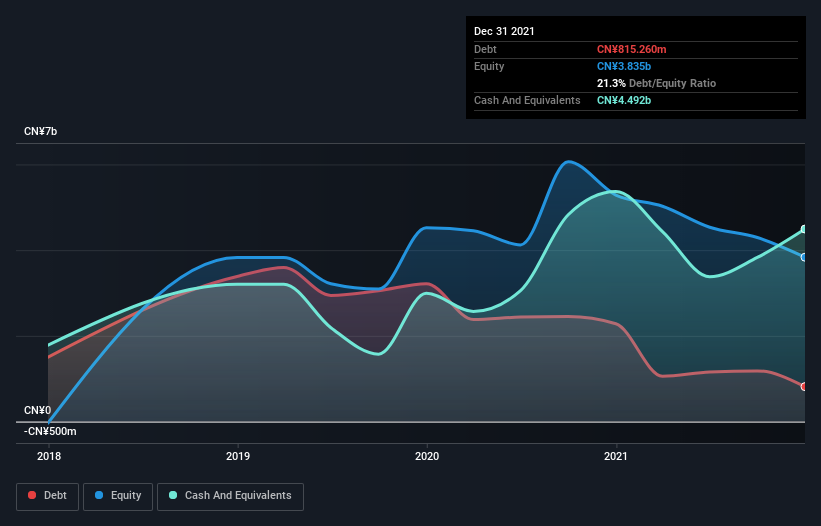Is OneConnect Financial Technology (NYSE:OCFT) Using Too Much Debt?
The external fund manager backed by Berkshire Hathaway's Charlie Munger, Li Lu, makes no bones about it when he says 'The biggest investment risk is not the volatility of prices, but whether you will suffer a permanent loss of capital.' It's only natural to consider a company's balance sheet when you examine how risky it is, since debt is often involved when a business collapses. We note that OneConnect Financial Technology Co., Ltd. (NYSE:OCFT) does have debt on its balance sheet. But the real question is whether this debt is making the company risky.
When Is Debt Dangerous?
Debt and other liabilities become risky for a business when it cannot easily fulfill those obligations, either with free cash flow or by raising capital at an attractive price. In the worst case scenario, a company can go bankrupt if it cannot pay its creditors. However, a more frequent (but still costly) occurrence is where a company must issue shares at bargain-basement prices, permanently diluting shareholders, just to shore up its balance sheet. By replacing dilution, though, debt can be an extremely good tool for businesses that need capital to invest in growth at high rates of return. The first thing to do when considering how much debt a business uses is to look at its cash and debt together.
Check out our latest analysis for OneConnect Financial Technology
What Is OneConnect Financial Technology's Debt?
The image below, which you can click on for greater detail, shows that OneConnect Financial Technology had debt of CN¥815.3m at the end of December 2021, a reduction from CN¥2.28b over a year. However, its balance sheet shows it holds CN¥4.49b in cash, so it actually has CN¥3.68b net cash.
How Healthy Is OneConnect Financial Technology's Balance Sheet?
We can see from the most recent balance sheet that OneConnect Financial Technology had liabilities of CN¥5.16b falling due within a year, and liabilities of CN¥343.1m due beyond that. Offsetting these obligations, it had cash of CN¥4.49b as well as receivables valued at CN¥1.15b due within 12 months. So it actually has CN¥135.9m more liquid assets than total liabilities.
This short term liquidity is a sign that OneConnect Financial Technology could probably pay off its debt with ease, as its balance sheet is far from stretched. Simply put, the fact that OneConnect Financial Technology has more cash than debt is arguably a good indication that it can manage its debt safely. The balance sheet is clearly the area to focus on when you are analysing debt. But it is future earnings, more than anything, that will determine OneConnect Financial Technology's ability to maintain a healthy balance sheet going forward. So if you're focused on the future you can check out this free report showing analyst profit forecasts.
In the last year OneConnect Financial Technology wasn't profitable at an EBIT level, but managed to grow its revenue by 25%, to CN¥4.1b. With any luck the company will be able to grow its way to profitability.
So How Risky Is OneConnect Financial Technology?
We have no doubt that loss making companies are, in general, riskier than profitable ones. And in the last year OneConnect Financial Technology had an earnings before interest and tax (EBIT) loss, truth be told. And over the same period it saw negative free cash outflow of CN¥532m and booked a CN¥1.3b accounting loss. But at least it has CN¥3.68b on the balance sheet to spend on growth, near-term. OneConnect Financial Technology's revenue growth shone bright over the last year, so it may well be in a position to turn a profit in due course. Pre-profit companies are often risky, but they can also offer great rewards. There's no doubt that we learn most about debt from the balance sheet. However, not all investment risk resides within the balance sheet - far from it. We've identified 2 warning signs with OneConnect Financial Technology , and understanding them should be part of your investment process.
Of course, if you're the type of investor who prefers buying stocks without the burden of debt, then don't hesitate to discover our exclusive list of net cash growth stocks, today.
Have feedback on this article? Concerned about the content? Get in touch with us directly. Alternatively, email editorial-team (at) simplywallst.com.
This article by Simply Wall St is general in nature. We provide commentary based on historical data and analyst forecasts only using an unbiased methodology and our articles are not intended to be financial advice. It does not constitute a recommendation to buy or sell any stock, and does not take account of your objectives, or your financial situation. We aim to bring you long-term focused analysis driven by fundamental data. Note that our analysis may not factor in the latest price-sensitive company announcements or qualitative material. Simply Wall St has no position in any stocks mentioned.

